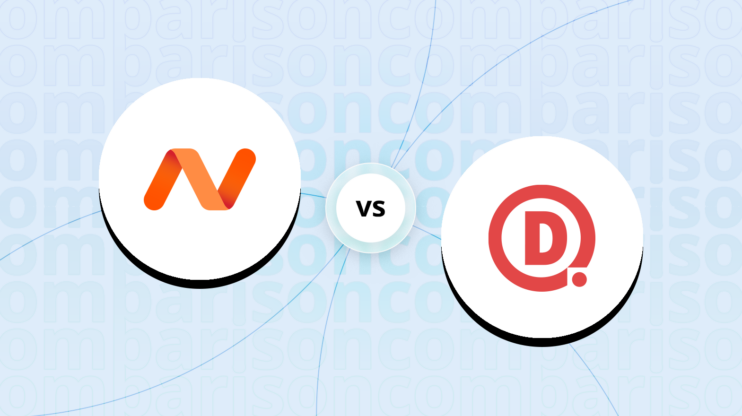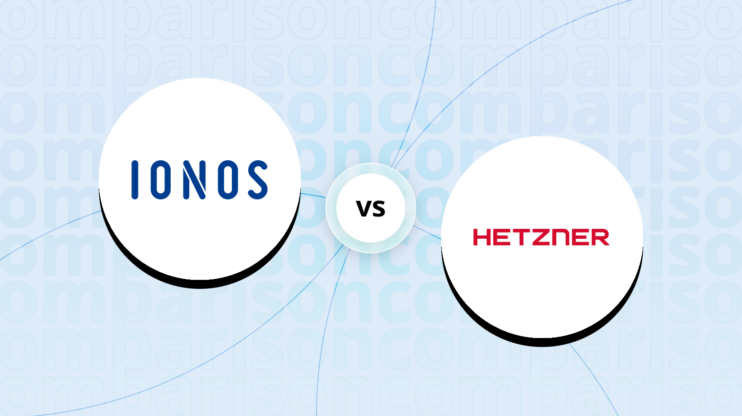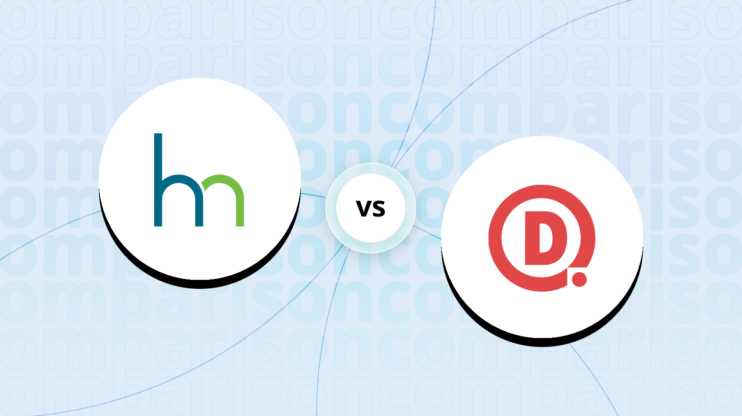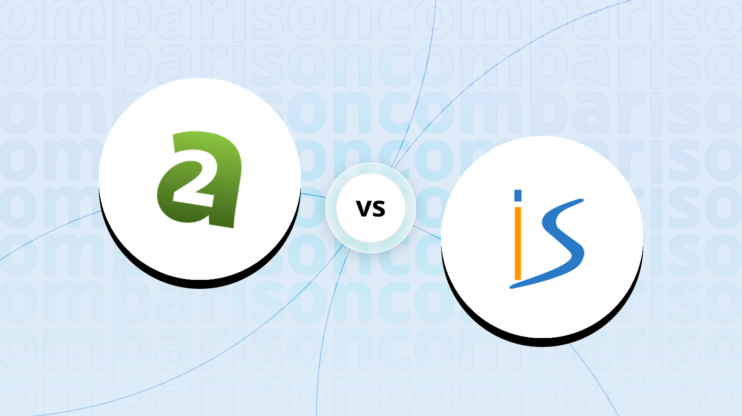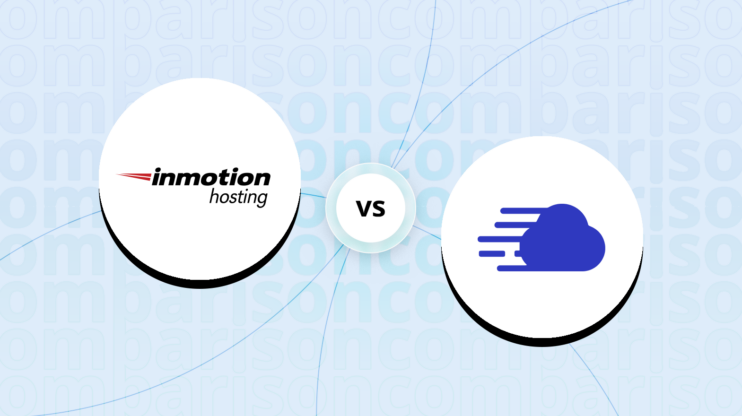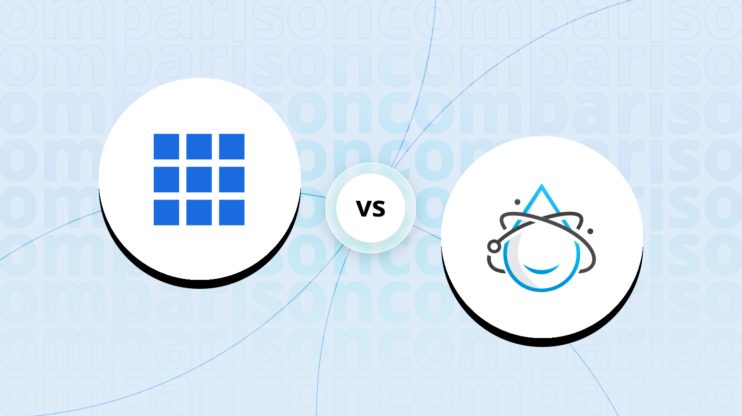Bluehost vs Directnic: Final verdict
Looking over Bluehost vs. Directnic, Bluehost clearly outshines Directnic with its extensive features and superior performance.
-
Bluehost (Overall grade: 8.2)
offers a rich array of hosting options, including shared, cloud, WordPress, ecommerce, VPS, and dedicated hosting. It boasts near-perfect uptime and impressive speed through SSD storage and a global content delivery network (CDN). Users benefit from AI-driven site creation tools, automatic WordPress installations, and comprehensive user management systems. Bluehost also ensures robust security with free and premium SSL certificates, DDoS protection, automated backups, and SiteLock malware scanning. However, some users have reported mixed experiences with customer support and occasional upselling. Despite these minor drawbacks, Bluehost remains a popular choice for its versatile hosting plans, reliability, and user-friendly features.
Directnic (Overall grade: 6.8)
focuses on fundamental hosting services with a significant emphasis on storage and bandwidth, catering well to individual and small business needs. It offers affordable plans, free domain registration in all packages, and user-friendly cPanel interfaces with basic email hosting. The 99% uptime guarantee and straightforward service make it a solid option for those on a budget. However, Directnic lacks advanced hosting options like cloud and dedicated hosting, and it falls short in terms of uptime guarantee and global speed reach. Customer feedback has highlighted occasional slow servers and unreliable customer service, impacting its overall appeal and competitiveness.
 Overall grade:8.2 |
 Overall grade:6.8 |
|
|---|---|---|
| Uptime and Availability | 9.0 | 6.3 |
| Hosting Performance | 8.9 | 7.2 |
| Hosting Security | 8.1 | 7.8 |
| Price | 8.1 | 7.8 |
| Hosting Features | 7.0 | 3.6 |
| Ease Of Setup | 8.6 | 7.8 |
| User Management | 8.0 | 6.5 |
| Customer Support | 7.9 | 7.7 |
| User feedback | 3.5/5 | 2.5/5 |
Hosting types offered
Both platforms provide a variety of hosting types, each designed to meet the different needs of users.
 |
 |
|
|---|---|---|
| Shared hosting | ||
| Cloud hosting | ||
| WordPress hosting | ||
| Ecommerce hosting | ||
| VPS hosting | ||
| Dedicated hosting |
Although both offer a variety of hosting plans tailored to different needs, in
certain cases, one platform may prove to be more suitable.
Detailed comparison
Uptime and availability
Evaluates the average uptime statistics, uptime guarantee and overall availability of the hosting
provider
Score Components:
- Uptime percentage (30%): evaluates the uptime statistics in given period of time
- Uptime guarantee (20%): Assesses if the platform offers an uptime guarantee and
whether the actual uptime matches the promised guarantee. - General performance (25%): Evaluates how fast is the average response time and overall
it’s stability. - Responsiveness (10%): Adaptability to different devices and screen sizes.
- Availability (25%): Reflects the total downtime and number of outages.
 9.0
9.0
 6.3
6.3
🏆 Winner Bluehost: Bluehost offers superior uptime and availability compared to Directnic.
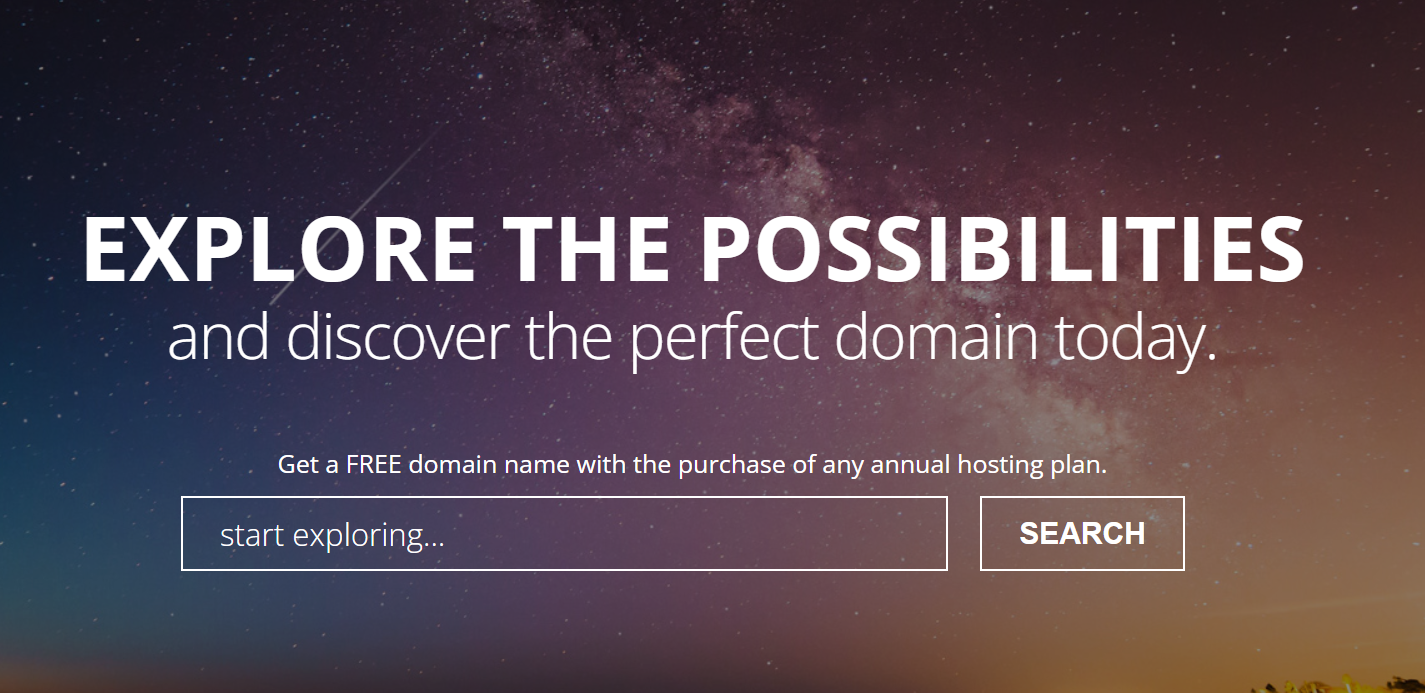
Bluehost demonstrates impressive reliability with near-perfect uptime according to multiple tests. Over a 30-day period, they scored 99.63% uptime and managed a perfect 100% in shorter test windows. Their server response times and ability to handle traffic spikes are consistently good, backed by a solid SLA that offers account credits for downtime.

Directnic, on the other hand, provides a 99% uptime guarantee, which falls short of industry standards. While it has affordable hosting plans and decent shared hosting features, its lower uptime guarantee and lack of advanced hosting options make it less attractive to users seeking high reliability. Customers have reported occasional slow servers and unreliable customer service, further impacting its overall appeal.
Which one has better hosting performance?
Score Components:
- Hosting speed (30%): This includes SSD quality, Load times, PageSpeed score ranges,
additional information on website speed, built-in plugins for performance enhancement, available caching
methods, and CPU/RAM options - CDN (20%): Considers whether CDN is available or not, whether it’s free or paid, and
the quality of the CDN service - Available data centers (30%): Evaluates the number of data centers and their locations
globally. - Scalibility (20%): Looks at whether elastic scaling is available, the process required
to scale (manual upgrade vs. automatic scaling), the presence of dedicated servers, and the costs
associated with scaling.
 8.9
8.9
 7.2
7.2
🏆 Winner: Bluehost: Reliable and high-performance hosting with top-tier speed and global data centers.
When comparing Bluehost and Directnic, Bluehost stands out with its impeccable speed, thanks to its SSD storage and scalable PHP workers. Bluehost features a built-in CDN available with all plans, optimizing images and reducing page load times globally. It supports a network of global data centers ensuring minimal latency and fast website performance. Directnic also offers SSD storage and CDN, but they don’t specifically mention the extent of their global data center network, making them less competitive regarding global reach and speed enhancement.
Website Speed
Bluehost guarantees world-class speed for WordPress sites, leveraging SSD storage and a built-in CDN to optimize the user experience. Directnic provides SSD storage and a CDN but lacks further details about their speed optimization techniques. Bluehost’s advanced infrastructure and increased CPU frequency help decrease load times and manage traffic efficiently. Directnic’s simple script installs and disk space options contribute well to overall speed but fall short compared to Bluehost’s enhanced features.
Scalability
Bluehost offers elastic scaling with a variety of plans, including VPS, dedicated, and cloud hosting, all designed to scale effortlessly. Users can benefit from 100% network uptime and easy upgrades. Directnic provides basic scalability options through their tiered plans, but there’s no mention of automatic scalability. Dedicated servers are not explicitly stated for Directnic, making it less versatile. Bluehost’s ability to scale high-traffic websites effectively cements its position as a leader in hosting services.
Which one has better security features?
and regulatory requirements
Score Components:
- Technical security measures (40%): This includes encryption, firewalls, DDoS
protection, secure configurations, server monitoring, access control and availability of security addons
(e.g Sitelock security). - Operational security measures (30%): Encompasses data privacy, backups and data
redundancy. - Compliance and certifications (20%): Adherence to legal and regulatory requirements
(e.g., GDPR, HIPAA) and possession of certifications (e.g., ISO 27001, SOC 2). - Business and reliability (10%): Factors in the provider’s reputation, uptime
guarantees, and customer support.
 8.1
8.1
 7.8
7.8
🏆 Winner: Bluehost: Bluehost offers a comprehensive set of security features, making it a robust choice for safeguarding your website.
Technical security measures:
Bluehost offers free SSL certificates provided by Let’s Encrypt and premium SSL options from Comodo, bundled with a $10,000 warranty. Directnic provides multiple SSL certificate plans, including basic, premium EV, and wildcard options, with warranties ranging from $10,000 to $1M. Both services offer PHP version management, but Bluehost’s PHP workers offer extra flexibility across multiple sites. Additionally, Bluehost incorporates advanced security measures like DDoS protection, automated daily backups, and a Web Application Firewall. Directnic offers a Secure Content Delivery Network and multi-layered DDoS protection but lacks some of the more detailed features provided by Bluehost.
Operational security measures:
Bluehost includes a suite of operational security measures such as 2-Factor Authentication, automated malware scanning via SiteLock, daily automated backups, and managed WordPress updates. Directnic shines with its Cyber Security Operations Center (CSOC) that operates 24/7/365, providing real-time protection and incident management. Directnic also offers a fully-managed Web Application Firewall, malware detection, and secure content delivery. While both offer substantial operational security, Bluehost’s additional email security and automated updates provide a more rounded security package.
Compliance and certifications:
Bluehost complies with the General Data Protection Regulation (GDPR) and can achieve PCI compliance on VPS and Dedicated servers. Directnic offers robust security measures but lacks specific information on GDPR and PCI compliance. PCI compliance information for shared hosting is not specified for Directnic. Without clear certifications, Bluehost has more defined compliance credentials.
 |
 |
|
|---|---|---|
SSL certificate |
Free & Premium SSL |
Basic, Premium EV, Wildcard |
Additional security features |
DDoS protection, automated backups, 2FA, Web Application Firewall, email & file encryption |
Multi-layer DDoS protection, Secure CDN, CSOC, SIEM, WAF, malware detection |
PHP versions |
Multiple versions, PHP workers |
Selectable via Hosting Console |
GDPR compliance |
Yes |
Not specified |
HIPAA compliance |
Not specified |
Not specified |
PCI compliance |
VPS & Dedicated servers |
Not specified |
Hosting features
Score Components:
- Domains (20%): Assesses the availability of a free domain, domain purchase options, and
pricing - Email (15%): Considers if the provider offers full email hosting, or is reselling
third-party service, and if the email is only transactional or not - Website builder (15%): Checks if website builder is available, and it’s user
friendliness and overall the level of customization allowed. - Staging environment (20%): Determines if a staging environment is available, allowing
for testing changes before going live. - FTP & SFTP accounts (10%): Evaluates if and how easily users can access FTP and
SFTP accounts - Git and SSH access (20%): Assess whether Git is integrated into the hosting service and
if SSH access is provided
 7.0
7.0
 3.6
3.6
🏆 Winner
Bluehost: Superior hosting services with versatile options for all user needs.
Bluehost and Directnic Hosting provide comprehensive hosting services, but they cater to different needs and preferences. Bluehost is known for its user-friendly, AI-driven site creation tools and unique specialized hosting options such as WooCommerce and WordPress hosting. These are highly beneficial for users seeking an easy-to-navigate builder with complex customization capabilities. Bluehost includes a free domain and SSL for the first year across its numerous hosting plans, and it also offers features like daily backups and malware scanning, which can enhance site security. However, promotional offers and renewal rates might impact long-term costs.
Directnic Hosting, on the other hand, covers fundamental hosting requirements with a significant focus on storage and bandwidth. Directnic offers a straightforward cPanel interface which is user-friendly for beginners, providing essential services like FTP accounts and ample email storage. Its Lite, Pro, and Deluxe plans cater well to budget-conscious users, although it lacks advanced features like free SSL beyond the first year and dedicated site-building tools. The inclusion of free domain registration in all plans and the 99% uptime guarantee are attractive features but don’t entirely match Bluehost’s extensive offering.
 |
 |
|
|---|---|---|
Free domain |
Yes, for the first year |
Yes |
Free SSL |
Yes, for the first year |
No |
Email hosting |
Yes, via Google Workspace |
Yes |
Website builder |
Yes, AI site creation tool |
No |
Staging environment |
No |
No |
FTP & SFTP accounts |
Yes |
Yes |
Git and SSH access |
Yes |
No |
Free backup |
Yes, for the first year |
No |
Money back guarantee |
Yes |
Yes |
a location.
As a result in rare cases the features mentioned here can differ from the ones you see on their websites.
Both providers support a range of users from beginners to experts with user-friendly website builders and WordPress staging areas. However, in terms of developer tools, both Bluehost and Directnic Hosting offer robust options including SSH access, support for multiple programming languages, and Git for version control, thus appealing to developers looking for advanced capabilities.
Email services:
Bluehost offers professional email hosting through third-party services like Google Workspace, providing users with a robust platform for managing their business emails and campaigns. Additionally, it often includes email options with its packages. Directnic provides a more traditional approach with POP3 email accounts included in all its plans, supporting basic email functionality suited for individual and small business needs but lacks advanced email hosting tools and external integrations.
Price
Score Components:
- Plan value (40%): What each pricing tier offers.
- Transparency and clarity (30%): Clearness of pricing structures.
- Flexibility of plans (20%): Range of options to suit different budgets.
- Hidden costs (10%): Additional expenses not included in the plan.
 8.1
8.1
 7.8
7.8
🏆 Winner
Bluehost: Affordable plans packed with essential features.
Evaluating the pricing of plans among various hosting providers can be complex due to their differing pricing and renewal strategies. Additionally, certain plans require annual commitments, which adds to the difficulty of making comparisons. The prices listed are based on monthly commitments; plans requiring annual commitments are indicated. Additionally, although some providers offer identical plans for WordPress and shared hosting, we have created separate tables for each to enhance clarity.
When comparing the pricing plans of Bluehost and Directnic, noteworthy differences arise in terms of features and pricing. Bluehost offers extensive plan options across various hosting types including shared, VPS, dedicated, cloud, and WooCommerce hosting. Its shared hosting plans start at $2.95/month with features like free domain and SSL for the first year, and free AI tools. Directnic, while also providing affordable options, starts at $2.48/month but lacks some of the freebies like a free domain and SSL. Bluehost’s plans tend to be more feature-rich, offering unlimited storage and advanced security options, which could justify their slightly higher prices.
 |
 |
|---|---|
|
Online Store $26.99
1 Website, 100 GB SSD, Multi-Channel Inventory, Secure Payments, SSL Value for price:8.2
|
Sitebuilder Starter $15.99:
N/A Value for price:N/A
|
|
Online Store + Marketplace $29.99
1 Website, 100 GB SSD, Marketplace Selling Tools, Secure Payments, SSL Value for price:8.2
|
Sitebuilder Pro $24.99:
N/A Value for price:N/A
|
|
N/A
Value for price:8.2
|
Sitebuilder Business $35.99:
N/A Value for price:N/A
|
 |
 |
|---|---|
|
Basic Hosting $10.99
1 Website, 10 GB SSD, Unmetered Bandwidth, Chat Support, Free Domain, SSL, AI Tools, Backups Value for price:8.5
|
Lite $2.48
3 Websites, 10 GB Disk, 100 GB Transfer, 50 Emails, 10 DBs Value for price:7.4
|
|
Plus Hosting $14.99
Unlimited Websites, Unmetered SSD, Unmetered Bandwidth, Chat Support, Free Domain, SSL, AI Tools, Backups Value for price:8.5
|
Pro $4.48
15 Websites, 100 GB Disk, 1000 GB Transfer, 100 Emails, 50 DBs Value for price:7.4
|
|
Choice Plus Hosting $18.99
Unlimited Websites, Unmetered SSD, Unmetered Bandwidth, Chat Support, Free Domain, SSL, AI Tools, Backups Value for price:8.5
|
Deluxe $7.98
30 Websites, 200 GB Disk, 2000 GB Transfer, 250 Emails, 100 DBs Value for price:7.4
|
|
Pro Hosting $28.99
Unlimited Websites, Unmetered SSD, Unmetered Bandwidth, Chat Support, Free Domain, SSL, AI Tools, Backups, High Traffic Value for price:8.5
|
N/A
Value for price:7.4
|
 |
 |
|---|---|
|
Cloud 1 $79.99
1 Website, 10 GB SSD, 2 vCPU, Unmetered Bandwidth, 24/7 Priority Support Value for price:8.0
|
Sitebuilder Starter $15.99
1 Website, Unlimited Disk, Site Search, SSL Value for price:7.4
|
|
Cloud 10 $109.99
10 Websites, 125 GB SSD, 20 vCPU, Unmetered Bandwidth, 24/7 Priority Support Value for price:8.0
|
Sitebuilder Pro $24.99
1 Website, Unlimited Disk, Password Protection, SSL Value for price:7.4
|
|
Cloud 25 $169.99
25 Websites, 175 GB SSD, 75 vCPU, Unmetered Bandwidth, 24/7 Priority Support Value for price:8.0
|
Sitebuilder Business $35.99
1 Website, Unlimited Disk, User Registration, SSL Value for price:7.4
|
|
Cloud 50 $249.99
50 Websites, 225 GB SSD, 150 vCPU, Unmetered Bandwidth, 24/7 Priority Support Value for price:8.0
|
N/A
Value for price:7.4
|
As a result in rare cases the prices displayed here can differ from the ones you see on their websites.
Enterprise plans
For enterprise hosting, Bluehost stands out with its offering that includes the Premium dedicated hosting plan at $119.99/month, featuring 16 GB RAM, 4 Core CPU @ 3.3 GHz, and 15 TB bandwidth. Directnic’s deluxe plan priced at $7.98/month offers up to 200 GB disk space and 2000 GB data transfer, making it suitable for medium-scale enterprises but potentially less capable of handling large-scale, high-traffic websites compared to Bluehost’s offerings.
Bluehost vs Directnic: Ease of setup
platform.
Score Components:
- Site migration (25%): Assesses whether the provider offers tools for site migration,
either automated or manual, and whether these services are free or require a fee. - Admin panel usability (35%): Evaluates the type of admin panel provided, such as the
standard cPanel or a custom solution, focusing on its accessibility and user-friendliness for both
technical and non-technical users. - Setup features (20%): Examines the availability and ease of use of various setup
features, including FTP accounts, file managers, email account setup, PHPMyAdmin, and easy CDN
configuration. - Help center quality (20%): Measures the quality and accessibility of the provider’s
help center resources, including articles and tutorials.
 8.6
8.6
 7.8
7.8
🏆 Winner: Bluehost: Offering a seamless setup experience with AI tools and extensive support resources.
Bluehost offers a user-friendly experience primarily through its AI WonderSuite tools, which help both technical and non-technical users set up WordPress websites easily. Its guided setup process and automatic WordPress installation streamline the initial stages of building a site. The simple setup wizard for online stores further enhances accessibility, making it easy even for beginners to create a functional website. On the other hand, Directnic Hosting employs the well-known cPanel interface, which is widely regarded for its user-friendliness and flexibility. The cPanel’s drag-and-drop builder, enabled via SiteBuilder by Weebly, makes website creation straightforward. While both platforms offer accessible interfaces, Bluehost’s AI-driven tools provide a slight edge for users looking for a more automated and intuitive setup experience.
For site migration, Bluehost offers resources for WordPress migrations, including articles and guides, which often come free with certain plans. Automatic migration of WordPress sites can significantly ease the transition for users. Directnic Hosting provides manual migration tools through its cPanel, allowing users to move websites with relative ease, but it may require a more hands-on approach compared to Bluehost’s offerings. Bluehost’s automated tools make site migration less cumbersome for users, giving it a notable advantage in this area.
Bluehost provides a comprehensive knowledge base with articles and 24/7 support through chat, phone, and email. The resources cover a wide array of topics, from setting up WordPress to troubleshooting common issues. Directnic Hosting also offers a detailed knowledge base with guidance on various setup and configuration tasks, in addition to 24/7 technical support. Both platforms ensure that users have access to essential information and assistance, but Bluehost’s combination of detailed articles and multiple support channels make it more accessible for a broader range of users.
User management
accessibility.
Score Components:
- Role customization (40%): Flexibility in creating and defining user roles and
permissions. - Ease of management (30%): User interface and tools for managing users.
- Access control (20%): Effectiveness of access control measures for different user
levels. - Scalability (10%): Ability to manage a growing number of users efficiently.
 8.0
8.0
 6.5
6.5
🏆 Winner Bluehost: Offers a comprehensive user management system with diverse roles and extensive permissions.
Bluehost excels in providing a sophisticated user management and role assignment system, setting the stage for efficient user handling and permissions. Bluehost offers three distinct user roles: Primary Contact, Admin Contact, and Tech Contact, each with specific permissions. The platform enables the Primary Contact to have exclusive control, adding an extra layer of security. Roles within Bluehost are clearly defined and the flexibility to add, edit, or remove user roles ensures that accounts are managed effectively according to the specific needs of an organization. Directnic’s specifics on user roles and permissions are not available for a direct comparison, suggesting a less transparent system in this regard.
Bluehost’s user interface for managing roles and permissions is straightforward and user-friendly. Users can easily access these features through the Bluehost Account Manager. The process to add, edit, or delete users involves a few clicks, making it simple to navigate. Bluehost’s platform guides the user through each step seamlessly, ensuring that even non-technical users can perform administrative tasks efficiently.
Bluehost demonstrates strong access control measures essential for organizations with a large number of users. The Primary Contact role centralizes major decisions and account communications, providing clear oversight. The Admin Contact and Tech Contact roles provide necessary access based on responsibilities, ensuring optimal task delegation. This structure supports efficient management as the number of users grows, without compromising on security or administrative efficiency.
Bluehost User Roles Table
| Role | Description | Access Highlights |
|---|---|---|
| Primary Contact | Unique role; handles main communication and high-level decisions. | Edit account and payment information, manage user roles, purchase and manage products and services, renew products, and edit domain WHOIS information. |
| Admin Contact | Manages settings and permissions for other users (except Primary Contact). | Edit account payment information, manage user roles, purchase and manage products and services, renew products, and edit domain WHOIS information. |
| Tech Contact | Focuses on technical aspects of managing the account. | Manage products and services, renew products, and edit domain WHOIS Admin and Tech information. |
Customer support
hosting provider.
Score Components:
- Support communication channels (30%): Measures the variety of customer support types
provided (live chat, chatbot, email, phone, etc.) - Availability (20%): Assesses the availability hours for each channel, including 24/7
support options. - Technical support quality (30%): Assesses whether the provider offers comprehensive
technical support, including hardware upgrades (e.g., HDD to SSD), software installations, and web
server configuration changes. - Enterprise support (20%): Checks if there are dedicated or priority support services
for enterprise-level customers.
 7.9
7.9
 7.7
7.7
🏆 Winner Bluehost: Known for its extensive support channels and additional advanced options, Bluehost edges out its competitor in customer service.
 |
 |
|
|---|---|---|
Phone support |
||
Live chat support |
||
Chatbot |
||
Email/ticket support |
||
Enterprise support (dedicated agent, priority support) |

Bluehost offers live chat and phone support around the clock, ensuring constant availability for its users. In addition, it provides an extensive knowledge base, video tutorials, and expedited support for dedicated hosting issues to cater to more specific needs. However, some customers have noted mixed experiences, citing long wait times and occasional upselling.
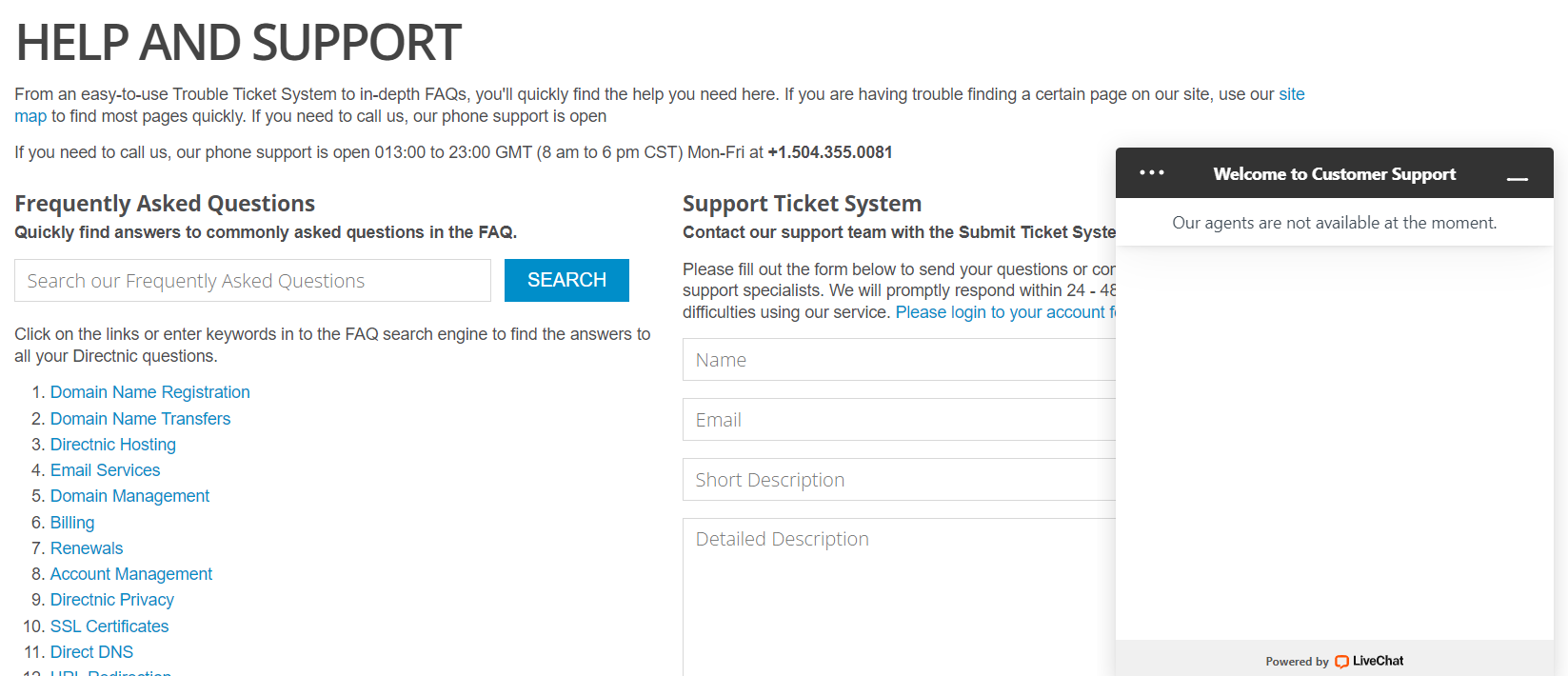
Directnic Hosting covers a broad scope of customer support channels, including chat, phone, email, and a ticket system, all accessible 24/7. Their knowledge base is thorough with articles on various topics, supplemented by video tutorials. Though their support is generally praised for being user-friendly and helpful, some users have reported concerns about server reliability and speed.
Bluehost vs Directnic: User feedback
User feedback on Bluehost as a hosting provider is highly mixed. On the positive side, many users commend their affordable pricing, ease of use with WordPress integration, and the comprehensive range of features such as free domain names, SSL, and excellent customer support. However, numerous reviews criticize the service for frequent outages, technical support issues, hidden fees, and unreliable performance, which have significantly impacted users’ businesses. Additionally, complaints about complicated navigation, aggressive upselling, and a steep learning curve for first-time users are common. While some users find Bluehost reliable and cost-effective, others have had severely negative experiences, citing problems like non-functional websites, billing issues, and inadequate customer service.
The hosting provider has a long-standing presence in the industry, which has contributed to a stable domain registration experience for some users. However, there have been significant issues with domain security breaches and slow response times for resolving these problems. Additionally, the server performance is reported to be slow, and customer support is not highly rated. Overall, the service has received average feedback, and some users would not recommend it.
Bluehost vs Directnic: FAQ
Which platform is better suited for hosting WordPress websites?
Bluehost is better suited for hosting WordPress websites due to its optimized plans that include automatic updates, 24/7 support, and a variety of themes and plugins. Directnic does not offer specialized WordPress hosting, making Bluehost the superior choice for WordPress users.
Are both platforms suitable for beginners?
Yes, both platforms are suitable for beginners. Bluehost offers an AI-driven site creation tool and automated WordPress installations, making it easy for those new to website hosting to get started. Directnic provides a user-friendly cPanel interface that simplifies website management for beginners.
Which hosting service offers better security features?
Bluehost offers superior security features, including free and premium SSL certificates, DDoS protection, automated backups, and SiteLock malware scanning. Directnic also provides multiple SSL options and DDoS protection but lacks some advanced features offered by Bluehost, making Bluehost the more secure option.
What are the major differences in pricing and value between bluehost and directnic?
Bluehost’s shared hosting plans start at $2.95/month with features like a free domain and SSL for the first year, while Directnic starts at $2.48/month but lacks certain freebies. Bluehost’s plans are generally more feature-rich, offering unlimited storage and advanced security options, which can justify their slightly higher prices.
Which hosting service offers more scalability options for growing websites?
Bluehost offers more scalability options, including VPS, dedicated, and cloud hosting that can scale effortlessly with growing website needs. Directnic provides basic scalability through tiered plans but lacks automatic scalability and advanced hosting options like dedicated servers, making Bluehost the better choice for scalability.
Which service is more suitable for hosting a high-traffic website?
Bluehost is more suitable for hosting a high-traffic website, offering more speed and processing power through dedicated IPs and RAID storage in higher plans. Directnic provides basic shared hosting with decent features but lacks the advanced options and reliability required for high-traffic sites, making Bluehost the preferred choice.
The making of this blog
We followed a clear, step-by-step process to write and research this article.









